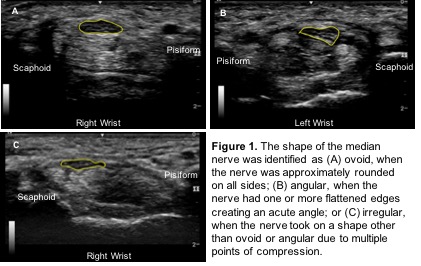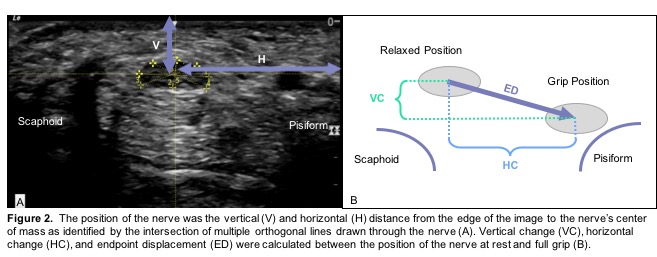Session Information
Session Type: ACR Poster Session B
Session Time: 9:00AM-11:00AM
Background/Purpose: Sonography is used to evaluate inflammation, identify joint changes, and measure morphology; dynamic assessment of tissue movement is an additional benefit. Dynamic sonographic identification of median nerve entrapment at the wrist during finger motion could improve understanding of carpal tunnel syndrome (CTS) etiology, as well as inform strategies to avert secondary CTS in patients with inflammatory conditions. This study aimed to evaluate a method for identifying and characterizing median nerve entrapment during functional grasp.
Methods: Healthy participants sat with their forearm on a table, palm up, and fingers in a relaxed position. A 12-MHz, linear transducer was placed in cross-section of the wrist at the level of the pisiform. Dynamic videos were obtained while the participant flexed the fingers until the tips touched the palm. Any compression of the median nerve was noted, nerve shape was identified at beginning and end of motion (Fig. 1), and direction and distance of nerve displacement was measured (Fig. 2). Frequencies/averages were calculated and chi-square/t-tests were used to compare right to left hands.
Results: Participants (N=51) were predominantly right-handed (92.5%) females (88.7%) with an average age of 24.4 years (SD, 3.5). During gripping, 72.5%/68.6% of participants had compression of the nerve in the right/left hands. From rest to grip, the frequency of angular or irregular shapes nearly doubled from 13.7% to 25.4%. Maximum nerve movement (mm) ranged from 0.76-1.08, 2.70-4.02, and 0.06-4.07 for vertical, horizontal, and endpoint displacement respectively; in 20% of hands, essentially no movement occurred. There were no significant differences between left and right, and no direction of movement predominated.
Conclusion: Despite being young and healthy, most participants had nerve compression during finger movement; some with significant entrapment (e.g., angular/irregular shapes). Longitudinal studies are needed to determine if these measures are a CTS predictor or risk factor. These methods can also be translated to clinical practice to inform personalized care for reducing or preventing symptoms in individuals with CTS and other inflammatory conditions.
To cite this abstract in AMA style:
Roll S, Cristino A, Mitchell J. Characterizing Changes in the Median Nerve during Hand Grip Using Dynamic Sonographic Imaging [abstract]. Arthritis Rheumatol. 2018; 70 (suppl 9). https://acrabstracts.org/abstract/characterizing-changes-in-the-median-nerve-during-hand-grip-using-dynamic-sonographic-imaging/. Accessed .« Back to 2018 ACR/ARHP Annual Meeting
ACR Meeting Abstracts - https://acrabstracts.org/abstract/characterizing-changes-in-the-median-nerve-during-hand-grip-using-dynamic-sonographic-imaging/


